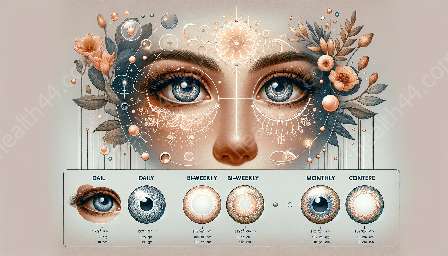Wearing contact lenses has become a common practice for people who need vision correction. However, wearing contacts also comes with the responsibility of proper care and hygiene to minimize the risk of eye infections and other complications. One question that often arises is whether swimming or showering while wearing contact lenses can pose risks to eye health. In this comprehensive topic cluster, we will explore the potential risks associated with swimming or showering with contact lenses, along with essential tips for contact lens care and hygiene.
The Risks of Swimming with Contact Lenses
Swimming with contact lenses can expose the eyes to various contaminants present in water, including bacteria, viruses, and other microorganisms. These contaminants can lead to serious eye infections, such as microbial keratitis, which is a corneal infection caused by bacteria or other pathogens. The risk of developing this condition significantly increases when wearing contact lenses while swimming, as the lenses can trap water and bacteria between the lens and the eye.
Another risk associated with swimming while wearing contacts is exposure to chemicals present in pool water. Chlorine and other disinfectants used in pools can interact with contact lenses, leading to discomfort, irritation, and potential damage to the lenses. Additionally, the chemicals in pool water can cause the lenses to dry out, adhere to the surface of the eye, or warp, resulting in discomfort and potential injury to the cornea.
Potential Risks of Showering with Contact Lenses
Similar to swimming, showering with contact lenses can also pose risks to eye health. The water in showers may contain harmful microorganisms, and the force of the water can flush these contaminants directly onto the surface of the contact lenses and the eyes. Furthermore, the steam and heat from the shower can contribute to the dehydration of contact lenses, leading to discomfort and potential damage to the eyes.
Contact Lens Care and Hygiene Tips
To minimize the risks associated with swimming or showering with contact lenses, it is crucial to adhere to proper contact lens care and hygiene practices. Here are some essential tips to ensure the safety and cleanliness of your contact lenses:
- Remove Before Water Activities: Always remove your contact lenses before swimming, showering, or any water-related activities to avoid exposing your eyes to potential contaminants in the water.
- Use Protective Eyewear: If you have prescription swim goggles, use them to maintain clear vision while swimming and protect your eyes from waterborne contaminants.
- Proper Cleaning and Disinfection: Follow the recommended cleaning and disinfection procedures provided by your eye care professional to ensure that your contact lenses remain free from harmful microorganisms and contaminants.
- Regular Replacement: Replace your contact lenses as recommended by your eye care professional, as worn-out lenses can increase the risk of eye infections and discomfort.
- Avoid Showering with Lenses: It is advisable to remove your contact lenses before showering to prevent the risk of exposure to waterborne contaminants and potential damage to the lenses.
- Keep Lenses Hydrated: Use appropriate contact lens solutions to keep your lenses hydrated and maintain their shape for comfortable wear.
Conclusion
Swimming or showering with contact lenses can indeed pose risks to eye health, as it exposes the eyes to potential contaminants and chemicals present in water. By prioritizing proper contact lens care and hygiene practices and being mindful of minimizing exposure to water while wearing lenses, individuals can significantly reduce the risks associated with swimming or showering with contact lenses. Ultimately, safeguarding eye health and vision should be a top priority for contact lens wearers, and embracing good habits in lens care and hygiene is essential for long-term eye health.





















